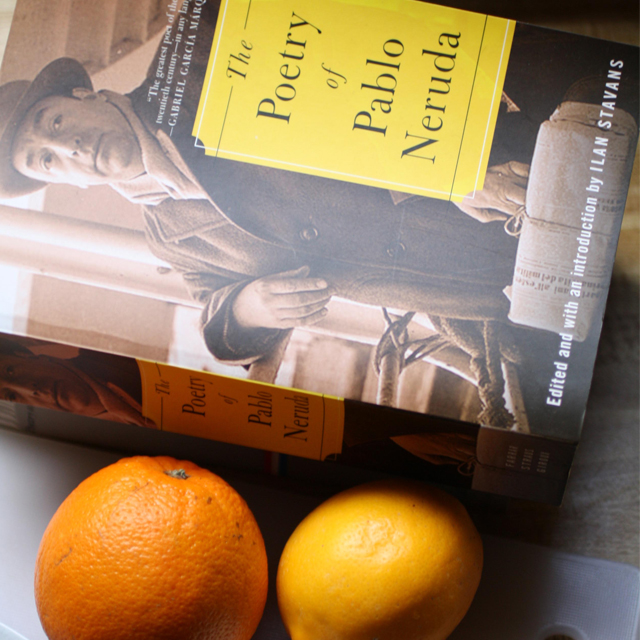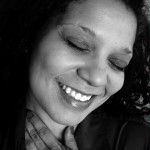Food and poetry make good bedfellows- I’ve said it before and this belief is the spark behind the food poet. If you look deeply enough into the collected works of a poet, chances are pretty high that you might find mention of bread or perhaps even an ode to an onion. I’m starting something new that I think might whet an appetite of a different sort. Poets in the Kitchen, looks to hear from contemporary poets on that communion of nourishment that happens when food and poetry combine to feed body and soul. I’m kicking things off with a Q&A with Ruth Ellen Kocher. I had the pleasure of attending a residency with Kocher and fell into the lush world of imagery she created in her third book, “One Girl Babylon” and excited to pick up her new book “Domina Un/blued“ in April.

The Food Poet: Food & poetry have certain commonalities. How do you describe the poetry of food?
Ruth Ellen Kocher: There is something about the pursuit of perfection that matters in the pursuit of both. Perfection isn’t necessarily fixed. The right peach, on the right day, at the right temperature, freshness, firmness, softness, sweetness … the convergence of circumstances that makes that peach, but more, the experience of eating that peach seem, in that moment, like perfection — this pursuit is so very much like my pursuit of a good poem, either as a writer or a reader.
TFP: How would you describe your cooking style and who has influenced it?
REK: I was married to a ‘foodie’ for many, many years. When my marriage was over, I almost came to reject everything epicurean. I would eat cereal for dinner 5 nights in a row. It was through this rejection that I realized the separation between process and project. I realized that whether I was taking the time to roast bones for a stock for a demi-glace, a process that could take 3 days, or whether I was shopping for fresh elements to an antipasta plate, my concerns were really the same. Flavor is a sort of constant sense of what’s ‘true’ that has import, whether you’re making a salad or preparing a feast. So, as a writer, I recognize my process as a striving to find what’s essential, what’s true, at the heart of my work, whether it’s highly complicated and conceptual or whether it’s minimalist and illustrative. The project fails if the most essential elements are not “true.”
TFP: Are there any cookbooks, chefs or websites that are your go-to resources?
REK: Madhur Jaffrey … everything and anything. I love Indian food and I’ve followed her recipes for years, not only because I find them to be the most ‘authentic’ tasting, but because I learn enough while using them so that I can go off on my own at other times.
TFP: If you could have dinner with any chef, who would it be?
REK: Jacques Pepin. I have always adored him. Again, he has always had the knack for stepping you through a complicated recipe in a way to make it seem not so complicated because he reveals the “why” as well as the “how” of food. I used to be a little jealous of his daughter who shared the spotlight with him in a father/daughter spot they had years ago. I thought she was the luckiest girl in the world. Her dad was Jacques Pepin!
TFP: You’re reading a book of poetry and stumble upon a poem that inspires you to create a dish. What is the poem and what is the dish?
REK: I can’t say that this question brings anything to mind immediately. There are the obvious references, Williams and plums, Bishop and figs. I think of Beckian Fritz Goldberg and pomegranate. Pau Llosa and bread. Ross Gay and raspberries. I think my associations are based more on the food as element than the food as dish.
TFP: When you think of food and poetry, do any specific poems come to mind?
REK: I cannot avoid being self-referential here. I think I use references to food more than most writers I know. Most often, I talk about fruit. I can’t help going back to classic lyric reference and there’s nothing more classic than sex, death, and fruit.
TFP: Do you ever find yourself influenced by food when writing poetry? Are there any foods or drinks that are part of your writing process?
REK: I was slicing open a peach the other day that had such a spiky blood red center. I thought, I should take a picture of this peach. I should write a poem about it. I almost, also, remembered that I’d done as much a few years ago, and again a few years before that. Is there anything more primal than a piece of fruit? That said, I do like a nice cocktail and yes, I will have one when I’m writing sometimes on the weekend or in the evening. I don’t always want my writing to be so serious. I try to remember that it’s ‘fun’. Cocktail of choice- Maker’s Mark Manhattan or something fruity with rum but not too sweet.
TFP: Do you find yourself writing mostly in the mornings, days or evenings?
REK: I’m an around the clock writer. I write spontaneously but I also schedule writing times. Writing is a seamless activity in my life. I write anytime the mood strikes. I am constantly jotting things down. I send myself voice recorded files that I make on my phone. I can recite a line to myself while I’m driving and discover it a month later. I work from bits and pieces I’ve squirreled away, often.
TFP: What are you working on right now?
REK: I’m working on a long poem of contiguous utterances. I’ve been playing around with notions of continuity vs. contiguity … and the ways contrast can ‘make it new’.
TFP: What books are keeping you turning the pages right now?
REK: I’m teaching right now and only reading the books I’m teaching. I just finished teaching Christopher Stackhouse’s and John Keene’s book “Seismosis.” I’m about to teach Terrance Hayes’ book “Lighthead.” We’ll also be talking about Elaine Scarry’s “On Beauty and Being Just,” which has images of the most perfect, most colorful eggs on the cover. What is more just than an egg? Nothing.
About Ruth Ellen Kocher
Ruth Ellen Kocher won the Naomi Long Madgett Poetry Award for her first book of poems, Desdemona’s Fire (Lotus Press, 1999). When the Moon Knows You’re Wandering (New Issues Press, 2001), her second volume, received the Green Rose Prize in Poetry. Her most recent collection, One Girl Babylon, called “tender, tough poems” by Al Young, was published by New Issues Press in 2003. Her poems and essays have appeared in numerous journals, including The Missouri Review, She’r (in Iranian translation), Black Arts Quarterly, Denver Quarterly, Prairie Schooner, Poet Lore and Crab Orchard Review. She is a contributor to Black Nature: Four Centuries of African American Nature Poetry, From the Fishouse, IOU, Angles of Ascent, Garden of Forking Paths, New Sister Voices and Approaches to Teaching Narrative of the Life of Frederick Douglass, among other anthologies. She has been a fellow at the Bucknell Seminar, Cave Canem and Yaddo, and teaches in the MFA program at the University of Colorado-Boulder. Follow her online at ruthellenkocher.com or on twitter.

I love this new feature! Proves what I’ve believed all along, that writers love food. Looking forward to reading more.
Thanks Nicole. I’ve been excited to share it and have some great stuff coming up too.
Food and poetry, a perfect combination ~ Thanks for sharing this interview ~
And I am happy to have found a blog devoted to food & poetry ~ A terrific combination ~
Thanks Grace. I’m glad you enjoyed the interview. I find myself ever intrigued to hear how food works into poetry. They are such natural allies.